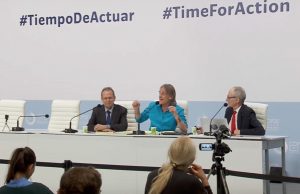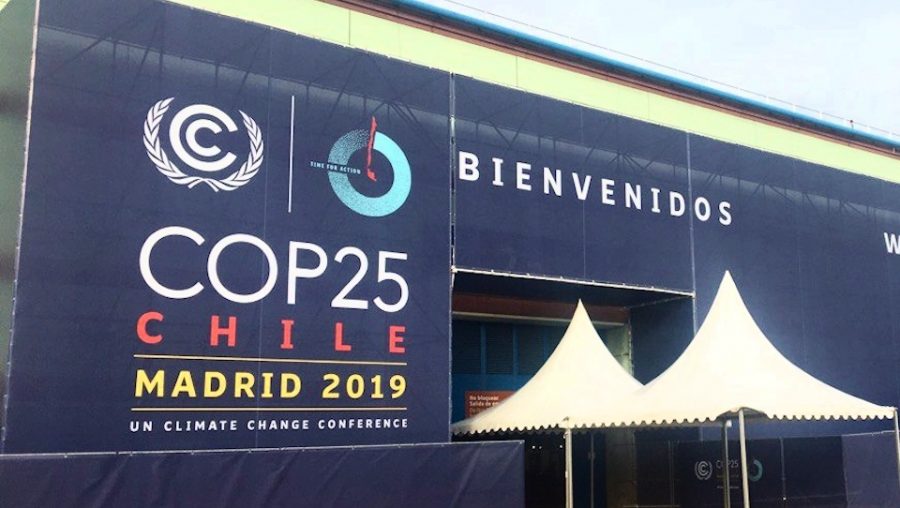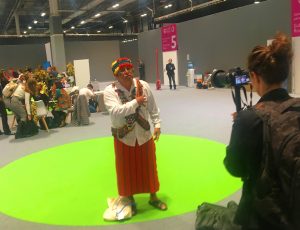This is a series of annual special reports for CMD from guest contributor Alex Carlin about his observations at the United Nations climate conference — and this year from the “People’s Summit” in Santiago, Chile as well. — CMD Editors
View Alex Carlin’s Dispatches from People’s Summit in Santiago here.
Is “Sustainable Capitalism” an Oxymoron?
December 24, 2019–COP 25 was a spectacular failure because the rich countries just blatantly avoided doing what the Paris climate agreement says they should do, such as reducing CO2 emissions and helping poorer nations cope, not to mention avoiding the urgent message from scientists that we must remove CO2 from the atmosphere.
Asad Rehman, a prominent climate justice activist, described it this way to DemocracyNow:
Governments came not willing to take action in terms of the lost decade, when they’ve literally done nothing…. They attempted to block any support for poorer developing countries…asking to have no liability for the damage that their inaction is causing. And more heinous than that is, not only are they not putting anything on the table in terms of genuine emission reductions or the desperately needed finance, what they wanted was loopholes, so that their big polluting companies could continue to pollute.
Is this the smoking gun to the charge from many activists that neoliberal capitalism will always throw your future under the bus, and never let anything off-topic like managing the climate crisis interfere one iota with business as usual?
At COP 25 I attended an astute talk on these issues by Luiz Marques, Professor at the State University of Campinas in Brazil. Later, he agreed to an interview.
A popular slogan of the climate movement is “system change not climate change.” But what exactly should we change in our current system in order to get a handle on restoring our climate?
Luiz’s position is that the thing we need to change is neoliberal capitalism, but I wanted to get past slogans that can be a bit broad and abstract. So I decided to ground the issue around the tangible concept of “100 Villages,” where 100 coastal villages around the planet will restore their local ocean pastures. This will greatly increase the fish populations, and as a bonus, via photosynthesis, draw down and repurpose so much CO2 from the atmosphere that we would be firmly on the road to climate restoration. Will neoliberal capitalism prevent these 100 villages from performing their crucial role?
I asked him, “The 100 Villages will sell their fish on the open market. What part of that is not capitalism?”
He said, “Market is not the same thing as capitalism. Markets are a way to exchange what I have with what I need. It can be with money or not, it’s not important. Circulation of goods is not capitalism, not yet. In Ancient Rome, in Ancient Greece, we did this.”
“What was the new concept in capitalism that is now getting us into such trouble?”
“The economic cycle is made in order to make ‘plus value,’ added value, surplus value, profit.”
“But aren’t the villages, when they sell the fish, getting an added value?”
“Maybe, but it is not the goal of the economic activity. Their goal is to increase their capacity for living.”
But I wanted to clarify what it is about neoliberal capitalism that constitutes a clear and present danger to our survival, even while the 100 Villages are chugging along doing their part. If capitalism is “to be” will that mean mankind is “not to be”? Luiz replied,
In capitalism, “to be” is to expand the initial capital, being and expanding are the same thing in the cellular metabolism of this system. But the more difficult it is for capitalism to expand in our finite world, the more environmentally destructive it becomes. But mankind is already no longer “fitting” into the biosphere. My grandfather was better than his grandfather. But my children will not be better than me, for the first time in history. Now it’s “avoid the worst case scenarios.” We are in big trouble, we can’t improve, only survive.
Luiz quoted the steady state economist Herman Daly who argues against growth on a finite planet, “sustainable capitalism is a bad oxymoron — self-contradictory as prose, and unevocative as poetry.”
“So, you mean the level of climate urgency dictates that we don’t have time to wait for neoliberal capitalism to stop destroying the biosphere, even if some people say it will be capable of refraining from that destruction sometime in the future?”
“Capitalism’s environmental unsustainability is a congenital, chronic, and degenerative disease of our global socioeconomic system,” Luiz responded. It is an “illusion that capitalism would have the power to morph — like a caterpillar into a butterfly — into an environmentally sustainable system.”
I said, “You seem to be saying that, under neoliberal capitalism, the 100 Villages are not prevented from doing their functions, but nevertheless the biosphere will necessarily be crippled, overwhelmed by the destructive effects of neoliberal capitalism. Why?”
“Let’s visualize the cycles. The 100 Villages have a commodity: fish. They exchange this by money. And with this money you buy another commodity. So you have C-M-C, Commodity-Money-Commodity. Capitalism is not this. Capitalism is M-C-M. The beginning and the end of the cycle is not commodity, it is money.”
“I can see how the M-C-M formula, Money-Commodity-Money, leads to the destruction of the biosphere, essentially because destroying the biosphere is such a great money maker. So, let’s talk about the improved system that must take its place for us to survive.”
Luiz said, “It’s a collective endeavor. It’s something that we have to think out and then act as a society. There is no recipe. The only way is politics, a functioning democracy. There is a need for political participation, either by voting or by street pressure. And we have to make the political leaders understand that if they don’t act they will be thrown out.”
I interpret Luiz as saying that, via popular political action, many activities generated by neoliberal capitalism will be classified as illegal because they threaten our survival. Ipso facto, that will constitute a dismantling of the current system, because at that point we will already be in another, new, economic system, governed by a calculus calibrated to our need to survive. Then, the new sustainable system will emerge piece by piece from the ashes of the old one. We have no time to wait for a 21st century Karl Marx to spell it out for us. We will cobble this new system together because we must do it to survive, and history will name it later.
For example, one way to stop “climate criminals” from destroying the planet with CO2 could be by replacing the current banking system with blockchain banks that can require that loans must contain a “climate stamp of approval.” That would constitute a different system from a neoliberal capitalism with no effective guardrails. I discussed this possibility last year at COP 24 in my blog entry “Redlining the Fossil Fuel Industry.”
Finally, I asked Luiz,
It is good that under today’s neoliberal capitalist system the 100 Villages, theoretically, are not prevented from carrying out their activities. Granted, the 100 Villages offer such a cheap solution that they may depress certain carbon markets which thrive on solutions with trillion dollar budgets, and this may generate serious opposition from the captains of capitalism. But do you agree that, given we are the “ocean planet,” the 100 Villages bringing the ocean pastures back to health is key to our survival?”
“Yes, this is crucial,” Luiz replied.
Shifting “Center of Cold” Underscores Critical Need for Climate Restoration
December 13, 2019–Here at the UN Climate Change Conference in Madrid (COP 25), I ran into a great scientist whom I have followed for years, Paul Beckwith. Paul is a renowned climate system scientist at the University of Ottawa, who puts out many informative and entertaining videos that have helped innumerable people, including myself, get up to speed on what he calls “abrupt climate system change,” where you ask questions like, ” will Earth become Venus any time soon?” In fact, his videos were my first entry into climate science, and I found them to be extremely well done, effective, and fun to watch.

As I interviewed Paul here, he enlightened me about Greenland becoming the “center of cold” in the Arctic. That is, if we don’t prevent the Arctic Ocean from losing its perennial ice, it will become a blue water ocean for most of the year, and Greenland will be colder than the North Pole.
Paul said, “This will lead to profound changes. Greenland is going to be exposed, and melt rates are going to go way way up,” leading to biblical sea level rises. But beyond submerging Miami, he explained that,
The center of cold in the Arctic will move fairly far to the south: from the North Pole (90 degrees North) to the center of Greenland (73 degrees North). So, since the jet air streams which travel around the Earth actually circle around the ‘center of cold,’ this will cause them to become even wavier than they are now, and also it will bring a jet stream ‘trough’ over North America for extended periods of time.
What does that mean? Remember how Hurricane Harvey in 2017 almost wiped Houston off the map? This jet stream waviness along with those troughs caused the rain deluge to hover over Houston for many days, dumping rain continuously, versus moving on after about one day as in past hurricanes. This waviness also creates havoc for farmers because it makes the weather much more unpredictable, with various disastrous effects on agriculture. Paul wondered, “How do you have a decent food supply? How do we grow crops to feed the world?”
This kind of dire observation leads Paul and others to feel a duty to “deploy Solar Radiation Management (SRM) techniques on an emergency basis to bring us back from the precipice.”
One version of SRM involves putting particles in the air over the Arctic to reflect sunlight back into space and thereby preserve the ice, to keep Miami dry and keep the farms feeding people.
John Nissen (Johnnissen2003@gmail.com ), a leading expert on the Arctic told me that,
People think of SRM geoengineering as a hugely dangerous activity. We’ve seen science fiction films where weather modification goes disastrously wrong. We’re terrified. And no academic can risk their reputation through arguing for geoengineering, except by disguising an intervention as something other than geoengineering. But, geoengineering is no longer something that can be treated as a possibility for the future. Geoengineering is absolutely vital over the next few years, to tackle the climate crisis, to reverse dangerous trends. All realistic scenarios have to start with action to prevent tipping points, especially preventing the Arctic Ocean from becoming locked into a low albedo state [low reflection of solar radiation] substantially free of sea ice at the end of each summer.
SRM is a serious subject that requires a more in-depth analysis than a blog, and I would encourage everyone to do their own research on it. But just the fact that Paul sees us on the precipice and needing SRM underlines the urgent emergency we are in. So, I asked him, “Paul, we really need to act immediately to manage this Climate Crisis. What should we tell Greta and all those who are demanding immediate action?”
Showing his ability to think outside the box, Paul said,
The US military budget is 700 billion dollars, and there are thousands of engineers and scientists figuring out ways to kill other people. If governments around the world said look, we have a climate emergency, so if no government around the world spends any money for weapons for one or two years, and instead uses all that money from the military budgets, and uses all the scientists and engineers, they could figure out a way to deal with CO2 and to ramp up renewables and do these other things. Let’s have Greta demand that.
I told Paul that back in 1999 (updated in 2011) I wrote a paper with Dr. Randall Forsberg, the late great analyst of military budgets, and founder of SANE/FREEZE (Committee for a SANE Nuclear Policy and the Nuclear Weapons Freeze Campaign, an iconic 1980’s anti-nuclear weapons group). Our paper showed how the USA would be more secure with a military budget of only about $50 billion. And shortly before Dr. Forsberg died, she informed me about a conference she attended that was concerned with the climate crisis, where they concluded that the money that would be required to adequately manage the climate crisis was roughly that same amount that we concluded was being wasted by the military.
That may be a disharmonic convergence, but spending trillions of dollars to manage the climate crisis is not necessarily a necessity. On Wednesday, I was a panelist on a program here at COP 25 called “Ocean Pasture Restoration,” presented by ScientistsWarning.org, where we explained how we can manage the climate crisis in ways that don’t require big money at all, as they actually pay for themselves.
A case in point is the “100 Villages” concept, conceived by plant ecologist and restorer of ecosystems, Russ George. People living near coastlines around the world, many of them in indigenous tribes, can restore their severely depleted fisheries by quickly and cheaply replenishing the nutrient deficits in their local ocean pastures. This brings back the plankton populations. The resulting photosynthesis causes significant numbers of gigatons of CO2 to be drawn down from the atmosphere. Soon the bigger fish come back in droves. Last September I wrote an article about it, and here at COP 25 my panel discussed how it is emerging now as the action we need most: an affordable action to bring CO2 concentrations down to levels that are safe.
Paul told me, “well we just need a bunch of Russ Georges.”
Yes, with a bunch of Russ Georges, and one hundred villages, we can be on the road to climate restoration.




Leave a Reply